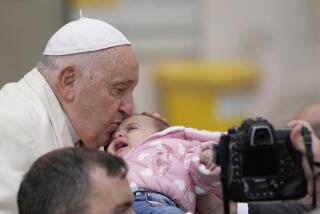Pope Urges Dialogue With Muslims
- Share via
TUNIS, Tunisia — On a lightning visit here carefully scripted to accommodate his frailty and avoid offending Islamic hosts, Pope John Paul II called Sunday for peaceful dialogue between Muslims and Christians in turbulent North Africa.
John Paul was the perfect guest in remarks to welcoming government officials, saving his concerns about Islamic fundamentalism for his meeting with leaders of the tiny Roman Catholic community in a nation of 8.5 million Muslims.
He urged prelates to maintain constancy and faith in the face of Islamic extremism that is thinning Christian ranks across the Middle East.
“Where violence and discord are unleashed, be messenger of the peace that comes from God and from reconciliation. . . . No one can kill in the name of God. No one can accept bringing death upon his brother,” the pope said. “Despite difficulties and incomprehension, go forth to meet your brothers and sisters without distinction of origin or religion.”
Looking fit, the 75-year-old pope moved slowly but firmly through a carefully planned 10-hour visit. He limped slightly but eschewed his cane, delivering six French-language addresses and in the process implicitly answering questions about his health.
“It was a light day. He didn’t even seem particularly tired at the end,” papal spokesman Joaquin Navarro-Valls told reporters on the flight back to Rome. “This trip represented another step in the pope’s opening toward Islam. It is a long road.”
On a lovely spring Sunday, the Tunisian capital scarcely noticed the pope. The speeches were all indoors, and they were carefully tailored to audiences of Catholics or Tunisian officials. Whisked around the city in motorcades, John Paul scarcely saw a Tunisian who did not wear a uniform or have government or Islamic rank.
Three early popes and a litany of saints hailed from North Africa. Carthage, now a ruin north of modern Tunis where the pope stopped briefly for private prayers, was a crossroads metropolis of the ancient world.
Today, Tunisia espouses religious tolerance, although its authoritarian government began cracking down on Islamic fundamentalists in 1992. More than 40,000 people have died in neighboring Algeria in four years of fighting between government soldiers and Muslim rebels seeking strict Islamic rule.
*
In a midday prayer, John Paul appealed for the release of seven Trappist monks being held by Algerian fundamentalist kidnappers, and his calls for religious moderation were echoed in remarks of both government and Islamic leaders.
“Each side must fight against violence. Our objective is to struggle against extremism,” said one imam, Abdelkrim Othmani.
As in neighboring countries, Islam is the official state religion in Tunisia, and Christians are not allowed to proselytize. But they are welcome to practice their faith freely here. Virtually all the 1,000 worshipers at the pope’s Mass in the colonial-era cathedral were European expatriates or university students from black African nations.
“I am very Catholic; my husband is Tunisian, is very Muslim. Our daughters are mostly Muslim, but of course we have a tree for Christmas. This is a good country for our sort of family,” French-born Danielle Ravard said as she awaited the pope in the cathedral.
Four white-turbaned Muslim imams came to a welcoming ceremony for John Paul led by President Zine el Abidine ben Ali, a former army general who has ruled since 1987 and told John Paul he will continue to rigorously oppose extremism.
“The pope has had a great welcome here. I am very grateful to the government for the gigantic efforts it made for this visit,” said the most Rev. Fouad Twal, the Jordanian-born archbishop of Tunis.
Speaking to Twal and other prelates, the pope said: “The encounter with Muslims must go beyond a simple sharing of life. It must permit an authentic collaboration.”
More to Read
Sign up for Essential California
The most important California stories and recommendations in your inbox every morning.
You may occasionally receive promotional content from the Los Angeles Times.













